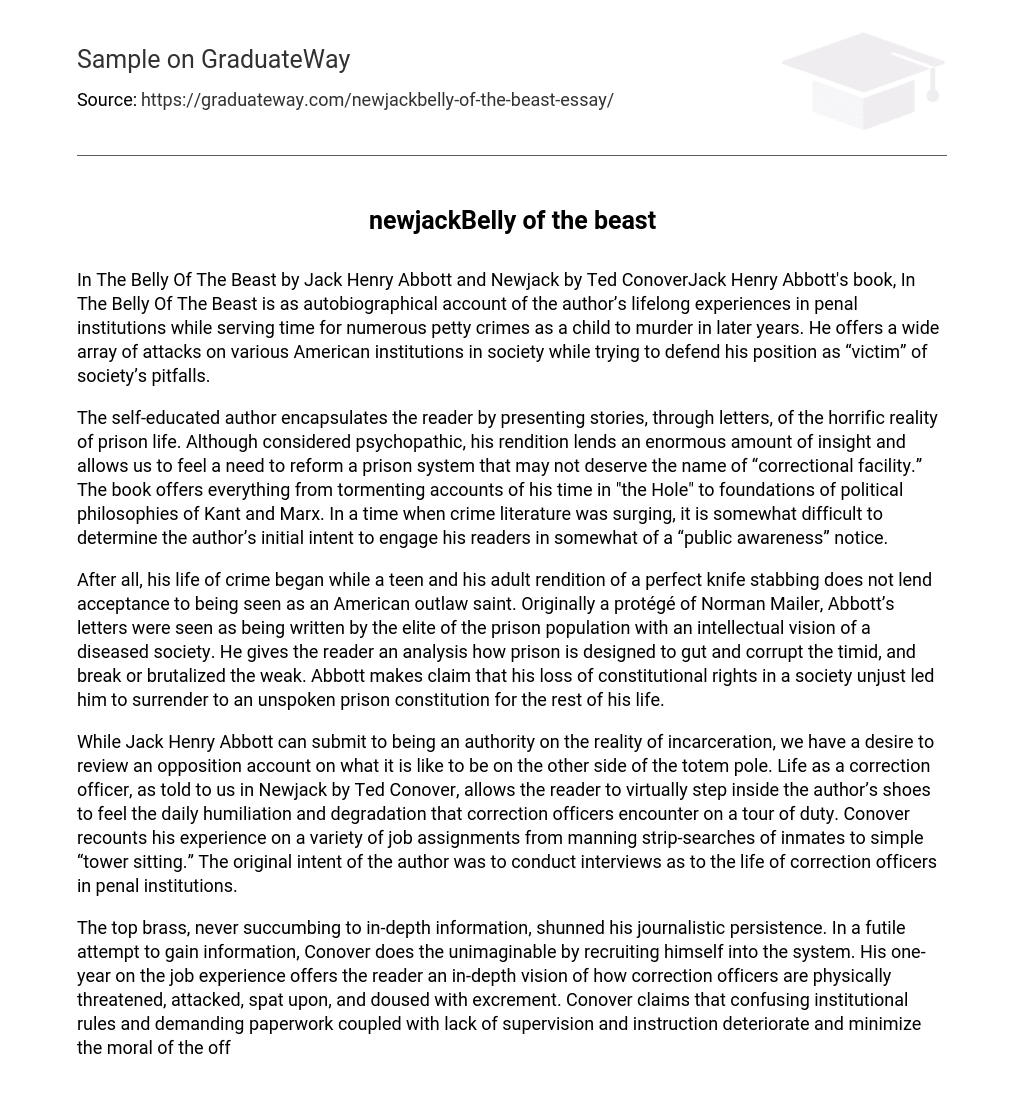In The Belly Of The Beast by Jack Henry Abbott and Newjack by Ted ConoverJack Henry Abbott’s book, In The Belly Of The Beast is as autobiographical account of the author’s lifelong experiences in penal institutions while serving time for numerous petty crimes as a child to murder in later years. He offers a wide array of attacks on various American institutions in society while trying to defend his position as “victim” of society’s pitfalls.
The self-educated author encapsulates the reader by presenting stories, through letters, of the horrific reality of prison life. Although considered psychopathic, his rendition lends an enormous amount of insight and allows us to feel a need to reform a prison system that may not deserve the name of “correctional facility.” The book offers everything from tormenting accounts of his time in “the Hole” to foundations of political philosophies of Kant and Marx. In a time when crime literature was surging, it is somewhat difficult to determine the author’s initial intent to engage his readers in somewhat of a “public awareness” notice.
After all, his life of crime began while a teen and his adult rendition of a perfect knife stabbing does not lend acceptance to being seen as an American outlaw saint. Originally a protégé of Norman Mailer, Abbott’s letters were seen as being written by the elite of the prison population with an intellectual vision of a diseased society. He gives the reader an analysis how prison is designed to gut and corrupt the timid, and break or brutalized the weak. Abbott makes claim that his loss of constitutional rights in a society unjust led him to surrender to an unspoken prison constitution for the rest of his life.
While Jack Henry Abbott can submit to being an authority on the reality of incarceration, we have a desire to review an opposition account on what it is like to be on the other side of the totem pole. Life as a correction officer, as told to us in Newjack by Ted Conover, allows the reader to virtually step inside the author’s shoes to feel the daily humiliation and degradation that correction officers encounter on a tour of duty. Conover recounts his experience on a variety of job assignments from manning strip-searches of inmates to simple “tower sitting.” The original intent of the author was to conduct interviews as to the life of correction officers in penal institutions.
The top brass, never succumbing to in-depth information, shunned his journalistic persistence. In a futile attempt to gain information, Conover does the unimaginable by recruiting himself into the system. His one-year on the job experience offers the reader an in-depth vision of how correction officers are physically threatened, attacked, spat upon, and doused with excrement. Conover claims that confusing institutional rules and demanding paperwork coupled with lack of supervision and instruction deteriorate and minimize the moral of the officers.
The author brings us directly in the renowned Sing Sing corrections facility, the oldest facility of its kind, and offers a vision into the reality of working in a maze of dirty corridors and leaking roofs. It is a tour of one of the least respected and most transient occupations. One is put in the emotional role of witnessing confined humans unable to do anything for themselves. Conover examines the psychological effect of working in a correction facility, including tense family life and the frightening thought of released criminals coming back for revenge.





